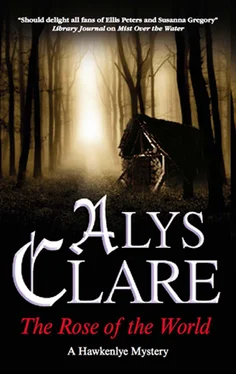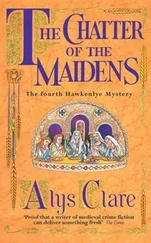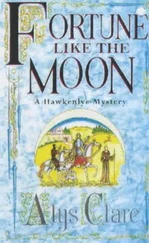Alys Clare - The Rose of the World
Здесь есть возможность читать онлайн «Alys Clare - The Rose of the World» весь текст электронной книги совершенно бесплатно (целиком полную версию без сокращений). В некоторых случаях можно слушать аудио, скачать через торрент в формате fb2 и присутствует краткое содержание. Жанр: Исторический детектив, на английском языке. Описание произведения, (предисловие) а так же отзывы посетителей доступны на портале библиотеки ЛибКат.
- Название:The Rose of the World
- Автор:
- Жанр:
- Год:неизвестен
- ISBN:нет данных
- Рейтинг книги:4 / 5. Голосов: 1
-
Избранное:Добавить в избранное
- Отзывы:
-
Ваша оценка:
- 80
- 1
- 2
- 3
- 4
- 5
The Rose of the World: краткое содержание, описание и аннотация
Предлагаем к чтению аннотацию, описание, краткое содержание или предисловие (зависит от того, что написал сам автор книги «The Rose of the World»). Если вы не нашли необходимую информацию о книге — напишите в комментариях, мы постараемся отыскать её.
The Rose of the World — читать онлайн бесплатно полную книгу (весь текст) целиком
Ниже представлен текст книги, разбитый по страницам. Система сохранения места последней прочитанной страницы, позволяет с удобством читать онлайн бесплатно книгу «The Rose of the World», без необходимости каждый раз заново искать на чём Вы остановились. Поставьте закладку, и сможете в любой момент перейти на страницу, на которой закончили чтение.
Интервал:
Закладка:
‘Leave this place,’ she intoned, almost singing the words. ‘Go away from here. I am not for you, for my fate is connected with the secret of this place and I would not have you risk its vengeance by taking from me what I do not freely give you.’
The trance was deepening. Slowly, she lessened the Eye’s swing until it hung still. Then she enclosed it inside her palm, and its light went out. Now they were just two people standing face-to-face in a small, simple chapel.
His eyes opened fully. He seemed totally bemused. He looked around him, apparently searching for something. Finally, he turned to her. ‘Meggie?’ he said. He sounded as if he doubted even that.
‘I am here, my lord,’ she said calmly. The jewel was back in its bag, hidden in the folds of her skirt. ‘What do you wish of me?’
He shook his head violently. ‘Nothing! You are — you are-’ He frowned, clearly confused. Then, with the ghost of a smile, he said, ‘You, my dear, are a vestal virgin. Keep your fire burning…’ The frown deepened, and for a moment he spun round as if some memory stirred. ‘There was a fire,’ he muttered. ‘A blue fire.’
‘There is a lamp on the altar.’ She pointed. ‘I have observed myself how some trick of the light allows its flame to catch in the blue of the window there.’ She indicated St Edmund on his horse, the sky blue above his head.
He did not look convinced. He was eyeing her suspiciously. ‘I would believe there was magic here,’ he murmured, ‘and that you, my Meggie, were a witch, only I do not believe in magic and, whatever the ignorant peasantry may say, there are no such things as witches.’
She bowed her head. ‘No, lord.’
His hand was under her chin. She raised her eyes and looked at him. ‘I leave for London in the morning,’ he said. He looked momentarily puzzled, as if half-recalling that he had already told her. ‘I wish that I could take you with me.’ He leaned forward and kissed her mouth, gently, affectionately. ‘But you belong here, witch of the wildwood.’
He took one long, last look at her. Then he turned away and strode out of the chapel.
She made herself wait. She heard his voice, shouting out some command, and another man’s raised in reply. There was the faint patter of conversation, quickly fading. When she was sure they had gone, she hurried over to the flagstone trapdoor and, raising it, flew down the steps into the crypt.
She did not bother with a light. She knew every inch of the place and, besides, the goddess’s power drew her unerringly. She fell to her knees before the niche where she knew the Black Madonna sat, opening her heart and pouring out her gratitude.
A long time later, she rose to her feet, went back up the steps and left the chapel. She looked down at Hawkenlye, most of its lights darkened now. She sent King John a silent good night.
Then she hurried off through the woods towards the hut and her bed.
SIXTEEN
At Hawkenlye Abbey, the nun who had replaced Sister Martha in the stables was surprised one morning when a shabby-looking peasant brought in an extremely handsome horse. It was not in very good condition, for its coat was dull and matted, its ribs showed, and its expensive leather harness was dirty. The reins had broken, and the two ends had been clumsily knotted together. When Sister Judith asked the man what he was doing with such a horse, he shuffled his feet and said lamely, ‘I found him.’
She guessed there was more to it than that. She suspected that the man had thought about keeping the animal, only to discover pretty soon that a fine riding horse is not very much use to a peasant. She knew she ought to report the man — the dear Lord alone knew how long the horse had been in his keeping — but something about his sad, defeated face and the dejected slump of his shoulders stopped her. If it were to be discovered that some time had elapsed between his finding the horse and bringing it to the abbey, they’d probably accuse him of trying to steal it, and horse thieves were invariably hanged.
Times were hard enough anyway without hanging a man. He might have dependants. Most men did. Sister Judith made up her mind. ‘You did right to bring the horse here,’ she said. Fixing the man with a hard stare, she added, ‘I am not going to ask you to tell me how and when you found him. If there are sins on your conscience, I suggest you pray for forgiveness. Now, be off with you, before I change my mind.’
He grabbed her hand, squeezed it, muttered something and ran.
Sister Judith saw to the horse’s immediate needs, removing the dirty saddle and bridle, giving him water and what she could spare of her meagre supplies of feed. Then she went to report to Abbess Caliste.
Abbess Caliste had had so many matters to occupy her mind since the drama of having a king in the infirmary that it was some time before she thought to connect the arrival of an unknown horse with recent events. It was a couple of days since the king had left, and she felt that the dust was still settling.
Abbess Caliste thoughtfully put down her stylus. She had been hard at work for hours, and a brief walk in the fresh air would do her good. She got up, put on her cloak and went outside, crossing the cloister and slipping out through the front gates. She hoped that one of the people she sought would be at the chapel; if not, she would have to send a messenger to the House in the Woods.
Helewise was on the point of leaving the chapel to go home. She would have left sooner, only a woman with a small child had appeared outside the tiny cell where Helewise had once lived, begging for food. The child, a little boy, had looked at Helewise with huge eyes in his dirty face. He was too weak to walk, and his mother had been carrying him.
Not for the first time, Helewise had raged silently against the men of power who cared not a scrap for the people. She hurried off to Meggie’s hut, where she heated water and prepared a thin soup, putting it in a pot and wrapping it in her cloak so that it would keep hot while she returned to the clearing. She also cut up the last of her small supply of bread so that the woman could dip it in the warm gruel and let the boy suck in the nourishment. She told them they could stay in the cell that night.
It was so little, but the woman fell on her knees in gratitude.
Helewise had gone to pray, trying to find it within her to ask pardon for her inner fury against her king. The battle with herself was long and, ultimately, futile.
As she closed the door of the chapel, Abbess Caliste came up the rise and approached her. She made a reverence, but, as she always did, Caliste caught her up and gave her a hug. Then she told her about the horse.
Helewise thought hard all the way home, and her concentration was so intense that she was back sooner that she had thought possible. She could hear Josse’s voice in the stable yard, and she hurried to find him.
‘Josse, I think-’ she began.
He took her hands and instantly exclaimed, ‘You’re freezing. Come inside. You can tell me whatever it is when you’re sitting by the fire.’
She did as she was told, containing her impatience while he fussed around her, shouting to Tilly for hot food and tucking a blanket round her. She resisted the urge to scream at him to stop. It was, she had to admit, lovely to be looked after.
When finally he was seated beside her, she said, ‘Josse, I want you to listen. I’m going to tell you a version of how Hugh de Brionne was killed, and I don’t want you to interrupt. When I’ve finished,’ she added as a concession, ‘you can comment.’
He grinned. ‘Very well, I’ll do as you ask.’ Putting a hand in front of his mouth to indicate that he would keep silent, he nodded for her to begin.
Читать дальшеИнтервал:
Закладка:
Похожие книги на «The Rose of the World»
Представляем Вашему вниманию похожие книги на «The Rose of the World» списком для выбора. Мы отобрали схожую по названию и смыслу литературу в надежде предоставить читателям больше вариантов отыскать новые, интересные, ещё непрочитанные произведения.
Обсуждение, отзывы о книге «The Rose of the World» и просто собственные мнения читателей. Оставьте ваши комментарии, напишите, что Вы думаете о произведении, его смысле или главных героях. Укажите что конкретно понравилось, а что нет, и почему Вы так считаете.












